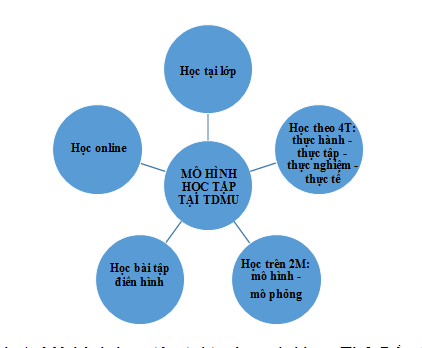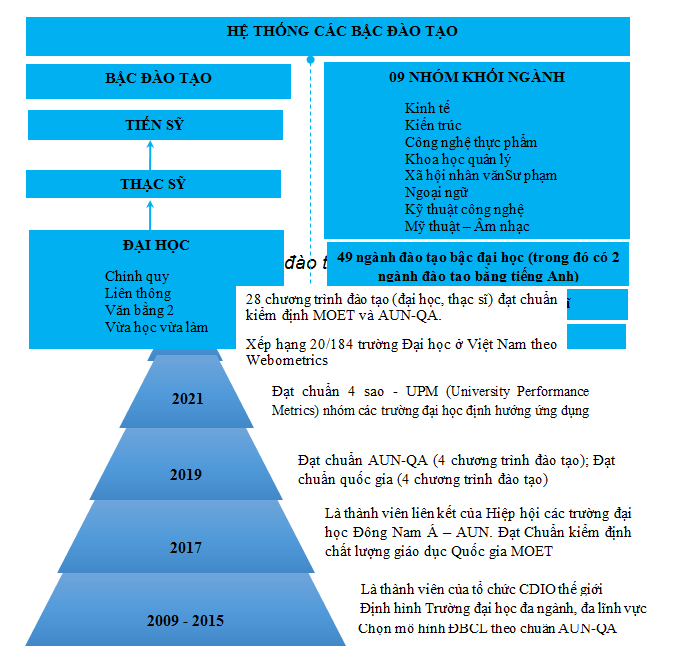Matching the destination of the applied university
After more than 13 years of operation, up to now, the University has been shaped as a multi-field and multi-disciplinary university, developing in terms of scale, quality and training efficiency; meeting the learning needs of the people, the industrialization requirements of the locality and the whole country; initially affirming the prestige and brand of a young university in Binh Duong. On the other hand, being established in the context of Vietnam's higher education entering a period of comprehensive renovation for international integration, at the same time, implementing Resolution No. 29-NQ/TW dated November 04, 2013 of the 8th Conference of the 11th Party Central Committee on fundamental and comprehensive renovation to meet the requirements of the country's industrialization and modernization, TDMU found its own way to create vitality and affirm the value of the University. One of the important breakthroughs that make a difference for TDMU is the development of a curriculum associated with social needs.
Vietnamese education is aiming to be learner-centered, helping learners approach active learning, so the fact that training institutions find new directions to develop curriculum will be a breakthrough, thereby affirming the training quality of the University. With TDMU, right from the early years of its establishment, the University has built a curriculum oriented to an applied university. But how does the curriculum satisfy learners' needs and meet the requirements of today's society? That question is concretized by the University by approaching the development of the Outcome-based education (OBE) curriculum, ensuring the comprehensive development of knowledge - skills - autonomy and responsibility for learners through expected learning outcomes. Expected learning outcomes reflect stakeholder requirements (both internal - learners and external - employers), meeting the requirements of the Viet Nam National Qualifications Framework for higher education and compatible with programs in the same major of countries in the region. Program activities include: program design, development, implementation, evaluation, and improvement. All these activities are operated in accordance with the PDCA (Plan - Do - Check - Act) procedure, ensuring that the training activities at the University meet the stakeholder requirements and the expected output standards.

In addition, the University always identifies the construction of the Output standards as one of the important stages in the chain of curriculum design activities. Therefore, since 2012, TDMU has boldly changed the direction to develop the curriculum under the CDIO (Conceive Design Implement Operate) initiative, meeting AUN-QA (Asean University Network - Quality Assurance) standards.
Not only designing the curriculum under the CDIO initiative in the engineering majors, but also in 2014, all blocks of training programs of the University completed the curriculum under the CDIO initiative. With those new steps, in 2015, the University became a member of the world CDIO organization. This is one of the factors contributing to the University affirming the training quality for society. Not only focusing on changing and developing the curriculum to catch up the trend of the times, the University also strengthens the teaching of social skills, improves the output standards of informatics and foreign languages for learners, and invests in facilities, etc. to synchronize quality improvement, help learners assert themselves and have more job opportunities after graduation.
Upholding training quality and focusing on learners' capabilities
Facing the challenge of social needs, TDMU always upholds the training quality and focuses on learners' capabilities. Therefore, every year, the curriculum is always updated and supplemented with practical modules, accompanied by new versions of the detailed outline so that the curriculum knowledge meets the ongoing reality. In 2017, after meeting the national quality accreditation standards, through the DACUM (Developing a Curriculum) meetings, from the employer feedback, the University strengthened the practical capacity of students in the learning process. The first basis for this improvement process is the Document No. 30/DHTDM-DTDH dated January 05, 2018, of the Rector of Thu Dau Mot University on the implementation of the regular university curriculum for the 2017 and 2018 enrollments. The university directs all majors to ensure that the structure of practice hours is at least achieving 40% of the total knowledge volume of the course. The training process is implemented through: (1) teaching theory; (2) teaching on models and simulations; (3) practical exercises, internships at workshops and laboratories; (4) applied/practical exercises outside of the University.

With the desire to empower the student's capacity and achieve high quality in teaching, when developing the curriculum, the University designs and allocates practice hours from the first year to the last year of the course. The curriculum shows openness, helping students understand specialized and interdisciplinary knowledge. Thereby, creating opportunities for students to choose their favorite professions again after finishing the first year, and convenient in registering for fundamental courses as well as favorable for students who want to study further and have many career options. In addition to ensuring connectivity and interdisciplinary, the curriculum development of the TDMU also ensures the professional knowledge and skills to train a team of young intellectuals who are capable and qualified their career after graduation, provide learners with opportunities for lifelong learning.

In order to update and develop the curriculum to ensure the connection with the output standards with teaching-learning activities and assessment according to the OBE-based principle, the University focuses on teaching and assessment methods from a learning-centered perspective, which plays an important role in implementing the university's educational philosophy to create motivation and initiative in learning for students; encourage students to take an active role in creating the learning process and teachers to be flexible in their plans for class; activities of experiential learning and community service learning are also closely connected by the University, helping students improve the quality of learning knowledge, skills as well as self-control capacity, sense of social responsibility and moral values.
Initial achievements of the TDMU's curriculum development

In the current development of science and technology, education cannot train people who can only do one thing or only know how to operate work like a robot. The University's responsibility in the training process is to focus on training vocational skills so that learners have enough knowledge when embarking on practical work, avoiding the case that employers have to "re-train". Vocational skills training must also be gradually upgraded to an international level, in order to provide students with all the elements of knowledge, skills, foreign languages, informatics, etc., to work abroad and integrate with the region under UNESCO's four educational pillars: learning to know, learning to be, learning to live together, and learning to do.
Thus, in order to achieve the goal and meet the output standards associated with social needs, TDMU has boldly chosen its development direction in line with the province's need to identify and step by step affirm the brand. The decisiveness and breakthrough in curriculum development over time have brought considerable results. Especially, from the DACUM seminars, the University boldly develops the Curriculum in the direction of increasing practice in the training process, enhancing skills, personal and professional qualities resulting to motivate the University to improve training activities by meeting the increasing demands of the labor market. More importantly, after graduation, being confident with the knowledge and skills acquired in the University, students are ready to serve society and affirm their own values, contributing to the construction of Binh Duong into a smart city in the near future.
PhD. Nguyen Quoc Cuong
Rector of Thu Dau Mot University
Translated by Thanh Tam